
Il congiuntivo – come conquistare questa bella brutta bestia!
The Italian Subjunctive – Learn how to conquer this great big ugly beast!
Il temuto Congiuntivo
The dreaded Subjunctive
Ah, il temuto congiuntivo! Terrorizza molte persone e dà loro i brividi come se fosse un orco spaventoso che mangia studenti innocenti a colazione. Anche tu hai paura di questa bestia intimidatoria!?
Ah, the dreaded subjunctive! It terrifies many people and gives them chills as if it were a terrifying ogre that eats innocent students for breakfast. Are you too afraid of this intimidating beast!?

Non è così spaventoso!
It’s not that scary!
Il modo congiuntivo italiano non è così spaventoso come sembra, ed è ora di smitizzarlo e farci amicizia! Non c’è nulla di cui aver paura! Il congiuntivo non vuole divorarti vivo… anzi, vuole diventare tuo amico e vivere in armonia con te! Non è un mostro terribile. Credo che tu possa addomesticarlo! Questo post ti aiuterà a capire meglio il congiuntivo.
The Italian subjunctive mood is not all that scary, and it’s time to demystify and make friends with it! There is nothing to be afraid of! The subjunctive doesn’t want to eat you alive… instead, it wants to make friends and live in harmony with you! It’s not such a terrible monster. I think you can tame it! This post will help you understand the subjunctive better.
Il congiuntivo italiano non è spaventoso affatto,
ed è il momento per demistificarlo e diventare amici!
The Italian Subjunctive mood is not all that scary,
and it’s time to demystify and make friends with it!
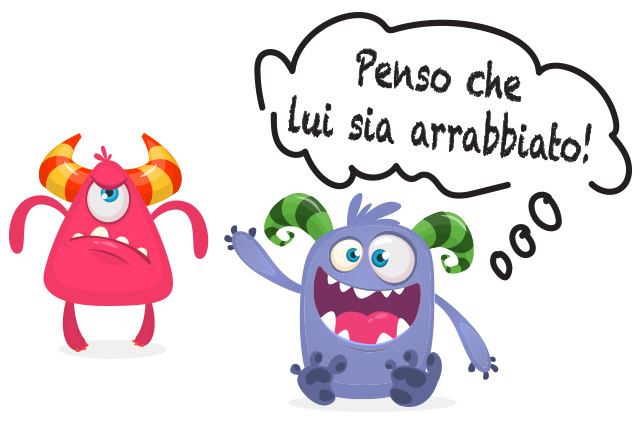
Cosa significa il Congiuntivo e perché si usa?
What does the subjunctive mood actually mean, and why is it used?
Il congiuntivo è un modo verbale ed è coniugato come gli altri tempi italiani: indicativo (presente), futuro, condizionale, imperativo, passato prossimo (perfetto o passato semplice), imperfetto e passato remoto.
The subjunctive is a verb mood and is conjugated like other Italian tenses: indicative (present), future, conditional, imperative, past perfect (or simple past), imperfect, and remote past.
Indicativo:
Io vado a scuola.
I go to school.
Futuro:
Io andrò a scuola.
I will go to school.
Condizionale:
Io andrei a scuola.
I would go to school.
Imperativo:
Vai a scuola!
Go to school!
Passato Prossimo:
Io sono andato/a a scuola.
I went to school.
Imperfetto:
Io andavo a scuola.
I used to go to school.
Trapassato Prossimo:
Io ero andato/a a scuola.
I had gone to school.
Passato Remoto:
Io andai a scuola.
I went to school.
Congiuntivo:
Mia mamma spera che io vada a scuola.
Mom hopes I go to school.
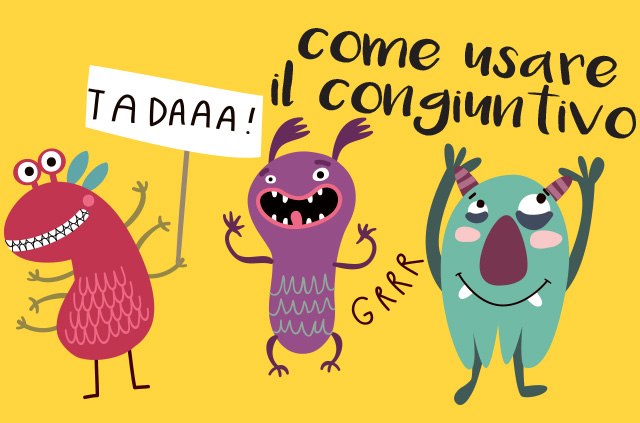
Come si usa il congiuntivo?
How to use the congiunto?
Il congiuntivo è quasi sempre usato in una proposizione subordinata introdotta da CHE. Condizioni specifiche espresse nella proposizione principale di una frase determinano l’uso del congiuntivo nella subordinata. Se la proposizione principale esprime un desiderio, una richiesta o una speranza, la subordinata dovrà essere al congiuntivo.
The subjunctive is almost always used in a subordinate clause introduced by CHE. Specific conditions expressed in the main clause of a sentence determine the use of the subjunctive in the subordinate clause. If the main clause conveys a desire, a demand, or a hope, the subordinate clause must be in the subjunctive.
Mia mamma spera che io vada a scuola.
Mom hopes I go to school.
Mia mamma spera (My mom hopes) is the main clause,
while io vada (I go) is the dependent clause.
The subjects of the two joined clauses are different.
Io voglio che tu rimanga qui.
I want you to remain here.
Io voglio (I want) is the main clause, while tu rimanga
(you remain) qui is the dependent clause.
The subjects of the two joined clauses are different.
Loro temono che voi non veniate.
They fear you all won’t come.
Loro temono (they fear) is the main clause, while voi non
veniate (you all won’t come) is the dependent clause.
The subjects of the two joined clauses are different.

Quando il soggetto è lo stesso: usa l’infinito, non il congiuntivo!
When the subject is the same: use the infinitive, not the subjunctive!
Io spero di andare a scuola.
I hope I go to school.
The subject “io” is the same in both clauses.
Lui crede di partire domani.
He believes he leaves tomorrow.
The subject “lui” is the same in both clauses
Io spero di andare a scuola.
I hope I go to school.
The subject “io” is the same in both clauses.
Sono felici di essere arrivati ora.
They are happy they arrived now.
The subject “they” is the same in both clauses.
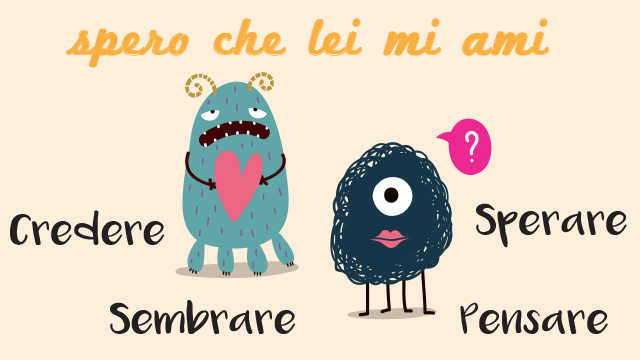
Quali sono i verbi che attivano il congiuntivo?
Which verbs trigger the subjunctive?
Il congiuntivo non si usa con tutti i verbi, ma viene attivato da specifici verbi che esprimono emozioni, desideri, dubbi, opinioni e incertezze. Questi verbi nella proposizione principale creano le condizioni ideali per l’uso del congiuntivo nella subordinata.
The subjunctive is not used with all verbs but is triggered by specific verbs that express emotions, desires, doubts, opinions, and uncertainties. These verbs in the main clause create the perfect conditions for the use of the subjunctive in the subordinate clause.
Verbi di opinioni
Verbs expressing opinions.
Credere = to believe
Pensare = to think
Sembrare = to seem
Sperare = to hope
Verbi che esprimono una comando, una richiesta, un desiderio
Verbs that express a command, a request, a desire, or a want.
Chiedere = to ask
Insistere = to insist
Suggerire = to suggest
Desiderare = to desire
Ordinare = to command, order
Volere = to want
VERBI CHE ESPRIMONO UNA PREFERENZA, UNA PAURA, UN SENTIMENTO
VERBS EXPRESSING A PREFERENCE, A FEAR, A FEELING, A PLEASURE.
Avere contento/felice/lieto = to be happy
Essere dispiaciuto = to be sorry
Essere infelice = to be unhappy
Essere scontento = to be displeased
Preferire = to prefere
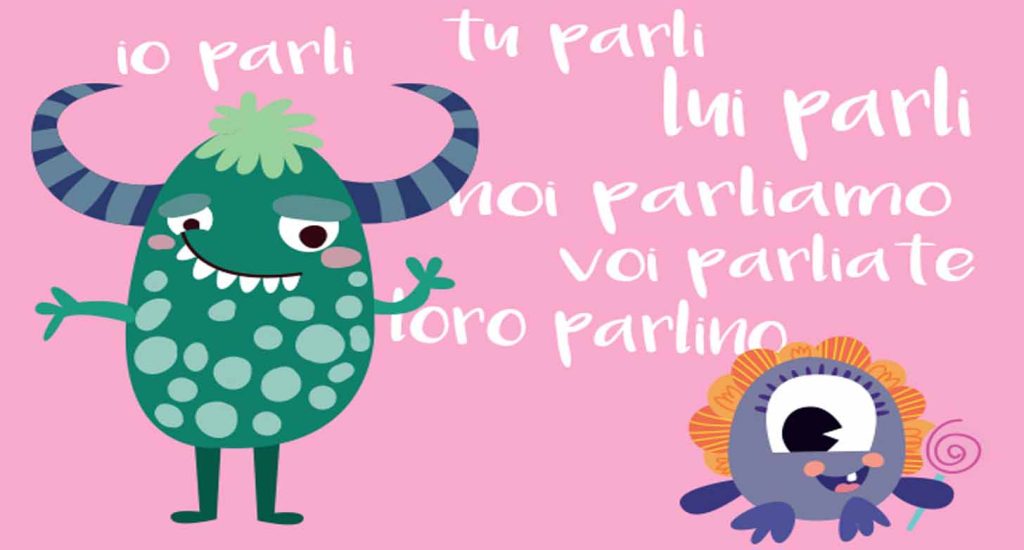
Come si coniuga il congiuntivo?
How do you conjugate the subjunctive tense?
Il Congiuntivo italiano ha quattro tempi: presente, perfetto, imperfetto, e pluperfetto.
The Italian Subjunctive has four tenses:
present, perfect (simple past), imperfect, and trapassato.
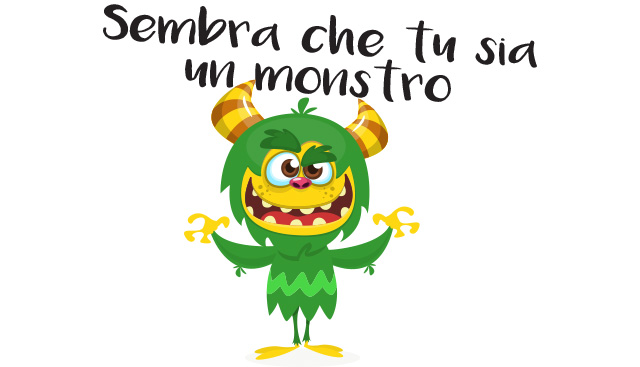
Congiuntivo Presente
PRESENT TENSE SUBJUNCTIVE
Io
Tu
Lui, lei, Lei
Noi
Voi
Loro
—are verbs
-i
-i
-i
-iamo
-iate
–ino
—ere verbs
-a
-a
-a
-iamo
-iate
-ano
—ire verbs
-a
-a
-a
-iamo
-iate
-ano
Congiuntivo Presente
Regular Present Congiuntivo
Parlare: parli, parli, parli, parliamo, parliate, parlino
Ricevere: riceva, riceva, riceva, riceviamo, riceviate, ricevano
Dormire: dorma, dorma, dorma, dormiamo, dormiate, dormano
Congiuntivo Perfetto
Irregular Present Congiuntivo
Avere: abbia, abbia, abbia, abbiamo, abbiate, abbiano
Essere: sia, sia, sia, siamo, siate, siano
Andare: vada, vada, vada, andiamo, andiate, vadano
Dire: dica, dica, dica, diamo, diciate, dicano
Dovere: debba, debba, debba, dobbiamo, dopiate, devano
Sapere: sappia, sappiamo, sappiate, sappiano
Fare: faccia, faccia, faccia, facciamo, faccia, facciano
Piacere: piaccia, piaccia, piaccia, piaciamo, piacciate, piacciamo
Congiuntivo Present Tense Phrases
Oggi sembra che tu sia un mostro.
Today it seems like you are a monster.
Dubbio che loro possano venire.
I am doubtful they can come.
Vogliamo che tu legga questo libro.
We want you to read this book.
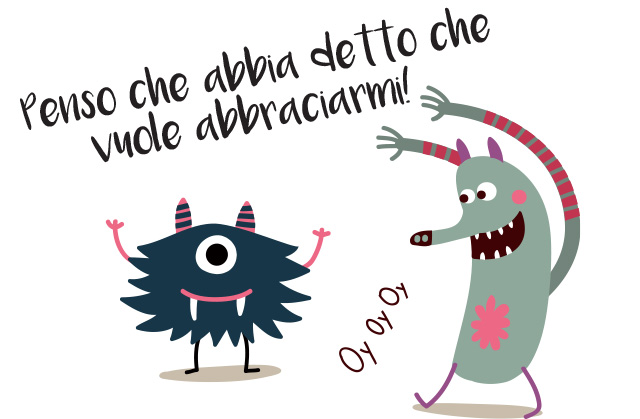
Congiuntivo Past
Perfect Subjunctive (Simple Past)
The Perfect subjunctive is formed by combining the present
subjunctive of AVERE or ESSERE with the past participle.
Present subjunctive AVERE + past participle
Abbia parlato, abbia parlato, abbia parlato,
abbiamo parlato, abbiate parlato, abbiano parlato
Present subjunctive ESSERE + past participle
Sia andato/a, sia andato/a, sia andato/a,
siamo andati/e, siate andati/e, siano andati/e
Congiuntivo Simple Past Phrases
Penso che abbia detto che vuole abbracciarmi, non mangiarmi.
I think he said he wanted to hug me, not eat me up.
Speriamo che tu non sia andato al mare oggi perché sta per piovere.
We hope you didn’t go to the beach today because it is about to rain.
Temete che Maria ci abbia detto una bugia.
You all fear Maria told us a lie.
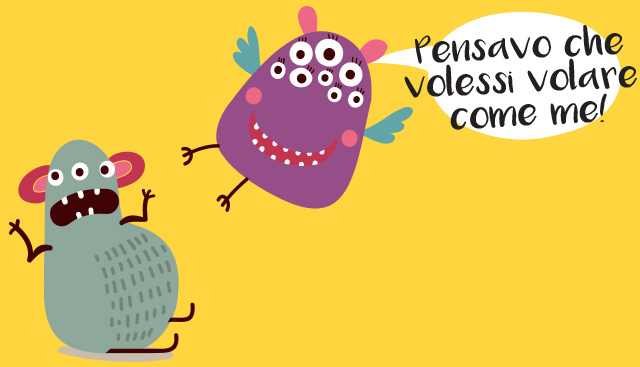
Congiuntivo Imperfetto / Imperfect Subjuntive
The imperfect subjunctive is required when the past action expressed by the verb in the main clause took place simultaneously in the past with the action expressed by the verb in the dependent clause.
Io
Tu
Lui, lei, Lei
Noi
Voi
Loro
—are verbs
—assi
—assi
—asse
—assimo
—aste
—assero
—ere verbs
—essi
—essi
—esse
—essimo
—este
—essero
—ire verbs
—issi
—issi
—isse
—issimo
—iste
—issero
Parlare: parlassi, parlassi, parlasse, parlassimo, parlaste, parlassero
Ricevere: ricevessi, ricevessi, ricevesse, ricevessimo, riceveste, ricevessiro
Dormire: dormissi, dormissi, dormisse, dormissimo, dormiste, dormissero
Avere: avessi, avessi, avesse, avessimo, aveste, avessero
Essere: fossi, fossi, fosse, fossimo, foste, fossero
Congiuntivo Simple Past Phrases
Pensavo (imperfetto) che
volessi (imperfect subjunctive) volare con me.
I thought you wanted to fly with me.
Giorgio credeva (imperfetto) che
la ragazza l’amasse (imperfect subjunctive).
He believed the girl loved him.
Sembrava (imperfetto) che
fosse (imperfect subjunctive) il giorno perfetto per festeggiare.
It seemed the perfect day to celebrate
Hai pensato (simple past) che
lei fosse (imperfect subjunctive) ancora in ufficio?
Did you think the she was still in the office?
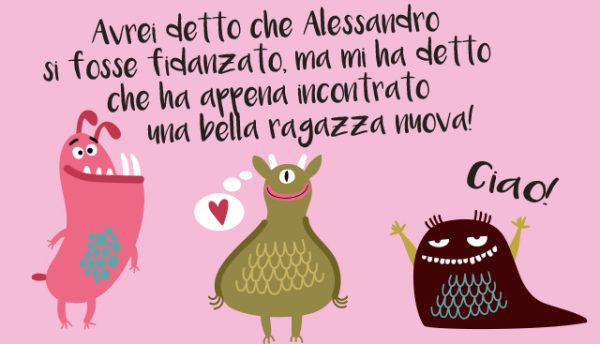
Congiuntivo Trapassato / Subjuntive Perfect Past
The Pluperfect Subjunctive is used when the past action expressed by the verb in the dependent clause occurred before the action expressed by the verb in the main clause.
Combine the Imperfect Subjunctive of Avere + past participle
Avessi parlato, avessi parlato, avesse parlato,
avessimo parlato, aveste parlato, avessero parlato
Combine the Imperfect Subjunctive of Essere + past participle
Fossi andato/a, fossi andato/a, fosse andato/a,
fossimo andati/e, foste andati/e, fossero andati/e
Congiuntivo (congiuntivo trapassato) Tense Phrases:
Avrei detto (condizionale passato) che Alessandro si fosse fidanzato
(congiuntivo trapassato) ormai, ma mi ha detto che ha
appena incontrato una bella ragazza nuova.
I would have said that Alessandro had got engaged by now
but he told me that he just met a beautiful new girl.
Credevo (imperfetto) che avessi comprato (congiuntivo trapassato)
il pane, ma non l’ho trovato nella dispensa.
I thought you bought the bread, but I didn’t find it in the pantry.
Avevano pensato (trapassato prossimo) che
voi vi foste sentiti (congiuntivo trapassato) male.
They had thought you had not felt well.
Lei pensava (imperfetto) che fossi tornato (congiuntivo trapassato) prima,
ma invece sei rimasto alla festa fino a mezzanotte.
She thought you had returned early,
but instead you stayed at the party until midnight.
Marco ha immaginato (passato prossimo) che Beatrice fosse
uscita (congiuntivo trapassato) perché non era in camera sua.
Marco imagined that Beatrice had gone out
because she was not in her room.
Esistono inoltre comuni congiunzioni che attivano il congiuntivo
There are also common conjunctions that activate the subjunctive.
The subjunctive is required after these impersonal verbs and expressions
only when the subject or the dependent clause is clearly expressed.
Affinché, perché = so that
Benché, sebbene = although
A meno che non = unless
A patto che, purché = provided that
Prima che = before
Qualora = in case
Senza che = without
Basta che = it’s enough
È meglio che = it’s better that
È probabile che = it’s probable
È improbabile che = it’s improbable that
A condizione che = provided that
Non importa che = not important that
Occorre che = necessary that
Bisogna che = necessary that
Può darsi che = it may be that
Sembra che = it seems that
È facile che = it’s easy
È difficile che = it’s difficult that
È importante che = it’s important that
È possibile che = it’s possibile that
È impossibile che = it’s impossible that
È giusto che = it’s fair/right that
Esempi / Examples
Sembra che loro non lo mangino.
It seems they don’t eat it.
È probabile che lui sia felice.
He is probably happy.
Bisogno che finiscano presto.
It’s necessary they finish soon.
Stasera andiamo al concerto che tu preferisci a condizione che
domani tu venga a quello che preferisco io.
This evening we go to the concert that you like on the condition that
tomorrow you come to the one I like.
Lavora affinché i figli possano frequentare l’università.
He works so that his kids can go to college.
Esce sebbene faccia molto freddo.
He goes out even though it is very cold.
Verremo da te a meno che non nevichi.
We will come to you unless it is snowing.
Fabrizio parte nonostante che stia male.
Fabrizio leaves even though he doesn’t feel well.
Studiate senza che lo suggerisca la professoressa.
You all study without the teacher suggesting to do so.
Hai immaginato che il congiuntivo fosse un
gigantesco mostro spaventoso.
Ora sai che comprende piccole creature bizzarre
che con la pratica puoi facilmente domare!
You imagined that the subjunctive was a frightening giant monster.
Now you know it comprises quirky little creatures that with practice, you can easily tame!

Se voi approfondire il Congiuntivo e praticare un po’ di più, ti consiglio “Il congiuntivo” di D. Mancini e T. Marani. Daniela è una mia amica, che ho conosciuto alla Scud’It Italian School di Roma. Potete trovare il libro su Amazon.
If you want to dive deeper into the subjunctive and practice some more, I recommend the “ill congiuntivo” by D. Mancini and T. Marani. Daniela is a friend of mine, who I met at Scud’It Italian School in Rome. You can find the book on Amazon.

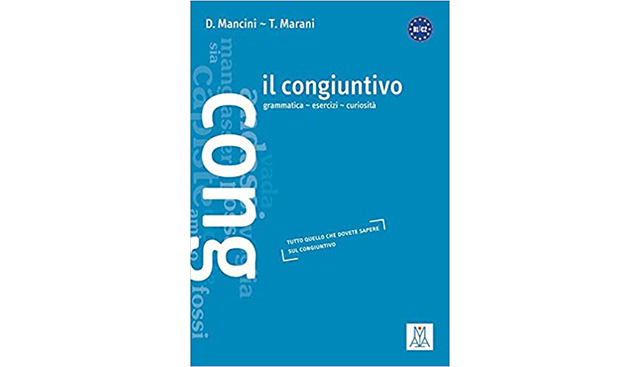











Hi M. , what is the word ” CHE” in Congiunt. ; a Conjunction or a Relative Pron. ??
the CHE is put / come in the Main Clause or in the Subord. / Secondaria clause ??
Ti Ringrazio
Ciao Nick, grazie per il messaggio.
When used in the context of the congiuntivo (subjunctive mood), “che” typically serves as a conjunction.
Function as a Conjunction:
In the congiuntivo, “che” is used to introduce a subordinate clause, which is dependent on the main clause. For example:
* Main Clause + che + Subordinate Clause (congiuntivo):
* Penso che tu sia felice. (I think that you are happy.)
* È importante che lui studi. (It is important that he studies.)
In these examples, “che” connects the main clause to the subordinate clause where the verb is in the subjunctive mood.
Function as a Relative Pronoun:
“Che” can also function as a relative pronoun in sentences that do not necessarily involve the subjunctive mood. As a relative pronoun, it introduces a relative clause that describes or gives more information about a noun mentioned earlier in the sentence:
* La ragazza che hai visto è mia sorella. (The girl whom you saw is my sister.)
In this case, “che” stands for “whom” or “that” and relates to “la ragazza.”
I hope this clarifies the use of “che” in Italian! If you have any more questions, feel free to ask.